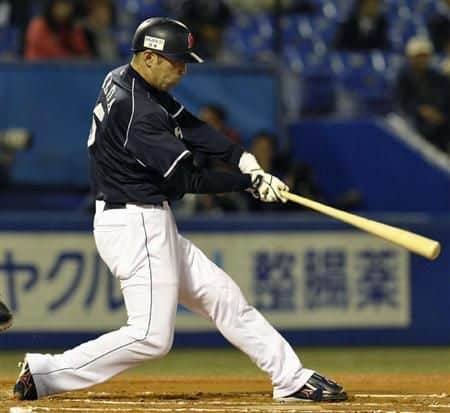
Statistics are a way journalists and fans can measure the greatness of athletes in sports, especially baseball. In the major leagues in both Japan and the United States, four prestigious statistical clubs demonstrate a player’s greatness: the 3,000 hit and 300 home run clubs for batters and the 300 win and 3,000 strikeout clubs for pitchers.
In a series of articles, I will write stories on each Japanese player in these prestigious clubs. I want to focus on the distinguished players that played in Nippon Professional Baseball (NPB) and highlight their contributions to the game. I am going to start this series by highlighting the NPB players in the 300 Home Run Club.
Next in my series is former Saitama Seibu Lions and Chunichi Dragons outfielder and utility man Kazuhiro Wada. Wada is tied for 38th on the all-time NPB list with 319 home runs with Takahiro Arai. I will run Arai’s story next week.
Wada is a fan favorite dating back to his amateur days in the mid-1990s, when he played at Tohuku Fukushi University and earned Most Valuable Player honors for the Sendai Big Six University League. As a senior in college, Wada won the batting title in the league. He would continue his hitting success in the Japanese Industrial League with a .429 batting average for Kobe Seiko. The Nippon Professional Baseball league was impressed by Wada’s offensive strengths and in 1996, he was drafted by the Saitama Seibu Lions. Wada would play 18 years for the Lions and the Chunichi Dragons, where he compiled a career .303 batting average with 319 home runs, 2,050 hits and 1,081 RBIs.
Wada demonstrated a great mix of power and average during his career. He hit 30 or more home runs four times and batted .300 or better eight times. In 2005, Wada won the Pacific League batting title with a batting average of .322 for the Lions. It was the first time a right-handed player won the Pacific League batting title since Hatsuhiko Tsuji in 1993. He was also a six-time winner of the Best Nine Award. This award is given to the best player at each position in NPB. Wada won it in five times in the Pacific League and once in the Central League. He earned the Central League MVP award in 2010 by batting. 339 with 37 home runs and 93 RBIs. Wada was also a six-time NPB All-Star.
In the post-season, Wada also demonstrated his dominance and championship caliber. He helped lead the Lions to four Japan Series (1997, 1998, 2002 and 2004) and the Dragons to two appearances (2010-11). After losing three Japan Series to the Tokyo Yakult Swallows, Yokohama Bay Stars and the Yomiuri Giants, Wada helped the Lions break their postseason losing streak by defeating the Chunichi Dragons in seven games in the 2004 Japan Series. He batted .310 with a Japan Series record tying four home runs, including one in a 2-0 victory in Game 1 and two in a 4-2 win in Game 6. It was the Lions’ ninth Japan Series title and first since 1992.
Individually, it was a record-breaking series for Wada as he broke two more longstanding Japan Series records. Wada had eight extra-base hits, which broke Isao Harimoto’s record of seven in the 1950 Japan Series. He also had 26 total bases, which broke Yasumitsu Toyoda‘s 46-year-old record of 25. Wada would go to two more Japan Series with the Chunichi Dragons in 2010 and 2011 but would be unable to win his second Japan Series title. Wada would hit his fifth and final Japan Series home run in a 2-1 Game 1 win over the Fukuoka Softbank Hawks in 10 innings. The Dragons would lose the series in seven games.
Internationally, Wada made himself known in the baseball world as a force to be reckoned with. In the 2004 Summer Olympics in Athens, Greece, Wada hit .333 with a .636 slugging percentage. Two years later, Wada was a member of the 2006 World Baseball Classic Champions, helping Japan beat Cuba 10-6 in the inaugural championship at Petco Park in San Diego, California.
In 2015, Wada retired from baseball and has become a popular broadcaster for the Dragons on the NHK TV network in Japan. He had a prestigious career in college, the NPB and in international competition. Wada’s unrelenting championship drive and impressive batting and home run skill sets has made him one of the greats in NPB history.
For more Japanese baseball features, check out JapanBall’s Articles and Features section!